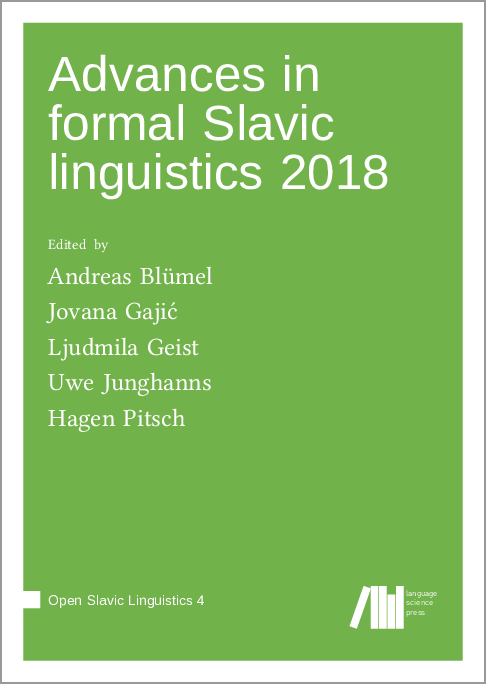We log anonymous usage statistics. Please read the privacy information for details.
Advances in formal Slavic linguistics 2018
Synopsis
Advances in Formal Slavic Linguistics 2018 offers a selection of articles that were prepared on the basis of talks presented at the conference Formal Description of Slavic Languages (FDSL 13) or at the parallel Workshop on the Semantics of Noun Phrases, which were held on December 5–7, 2018, at the University of Göttingen. The volume covers a wide array of topics, such as situation relativization with adverbial clauses (causation, concession, counterfactuality, condition, and purpose), clause-embedding by means of a correlate, agreeing vs. transitive ‘need’ constructions, clitic doubling, affixation and aspect, evidentiality and mirativity, pragmatics coming with the particle li, uniqueness, definiteness, maximal interpretation (exhaustivity), kinds and subkinds, bare nominals, multiple determination, quantification, demonstratives, possessives, complex measure nouns, and the NP/DP parameter. The set of object languages comprises Russian, Czech, Polish, Bulgarian, Macedonian, Serbo-Croatian, and Torlak Serbian. The numerous topics addressed demonstrate the importance of Slavic linguistics. The original analyses prove that substantial progress has been made in major fields of research.
Chapters
-
Situation relatives: Deriving causation, concession, counterfactuality, condition and purpose
-
Czech binominal každý 'each'
-
New developments in the semantics of noun phrases in Slavic languages
-
Demonstratives, possessives, and quantifier expressions in articleless Russian
-
The pragmatic effects of Macedonian li: An empirical study
-
Mirativity and the Bulgarian evidential system
-
From measure predicates to count nouns: Complex measure nouns in Russian
-
Silent HAVE needs revisiting: (Non-)possessive meanings with transitive intensional 'need' in Russian
-
Reference to kinds and subkinds in Polish
-
Maximal interpretation and definiteness of nominal phrases in Russian: Implication for the NP/DP parameter
-
Perfective dozapisyvat' – real or fake?
-
Demonstratives and definiteness: Multiple determination in Balkan Slavic
-
Definiteness in the absence of uniqueness: The case of Russian
-
Inherent vs. accidental uniqueness in bare and demonstrative nominals
-
The role of the correlate in clause-embedding
-
Torlak clitic doubling: A cross-linguistic comparison




